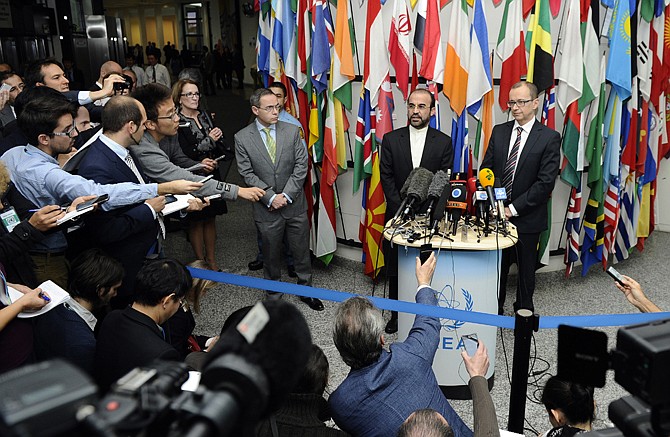VIENNA (AP) - U.N. efforts to investigate suspicions that Iran has worked on nuclear arms appeared to gain traction Tuesday, with both sides speaking of "very productive" talks after nearly two years of deadlock and agreeing to meet again on Nov. 11 in Tehran.
Negotiators for Iran and the U.N.'s International Atomic Energy Agency refused to go into details. But their expressions of optimism and agreement not only to meet again but also to do that in Tehran pointed toward forward movement.
Their decision to issue a joint statement, instead of their usual practice of speaking to reporters separately, was seen as a sign of progress. Read by Tero Varjoranta, head of the IAEA team, the statement spoke of a "very productive meeting" of "substantive discussion" and "cooperation" in the two-day talks ending Tuesday.
Comments from him and Iranian chief negotiator Reza Najafi, speaking in their own capacity, also were bullish. Najafi spoke of a "new chapter of cooperation," with the IAEA, while Varjoranta said he expected to "complete our work as quickly as possible."
It was the second time this month that talks focused on international concerns over Iran's nuclear ambitions ended positively and in line with the stated determination of top officials within Iran's new government to work on reducing such fears.
Iran also is seeking relief from crippling economic sanctions in return for concessions on its nuclear program.
Next week, a new round of talks about Iran's nuclear program is scheduled in Geneva by Iran and six world powers. Both sides described their last round of these talks in October as positive, with Tehran ready to discuss some curbs on programs that can create both atomic energy and the fissile core of nuclear arms.
While the Vienna and Geneva talks are formally separate, they are linked by concerns over Iran's nuclear aspirations, and progress in one may result in advances in the other.
Tehran denies either wanting or working on atomic arms.
The Vienna talks have been deadlocked over agency experts seeking an open-ended investigation in Iran, and its government insisting that a document be prepared that outlines the limits on what can be inspected, who can be questioned, and other constraints.
Expectations of progress were raised even before Monday's opening Vienna round after Iranian Deputy Foreign Minister Abbas Araghchi met with IAEA chief Yukiya Amano and promised "new approaches" meant to end the impasse.
Araghchi and other senior Iranian officials have repeatedly expressed willingness to work on reducing fears about Iran's nuclear aims since reformist Iranian President Hassan Rouhani took office in August. Araghchi is a senior negotiator for Iran at the Geneva talks.
Alluding to those negotiations, U.S. Secretary of State John Kerry said Monday that Washington is willing to test Iran's new style while keeping its "eyes wide open" to make sure that Tehran's words would translate into actions.
As part of its probe, the IAEA is trying to gain access to a sector at Parchin, a sprawling military establishment southeast of Tehran. The agency suspects the site may have been used to test conventional explosive triggers meant to set off a nuclear blast.
Amano said earlier this year he was concerned about satellite images showing asphalt work, soil removal and "possible dismantling of infrastructures" there.
Iran says such activities are part of regular construction that has nothing to do with alleged attempts to cleanse the area of evidence.
But Amano said that because of such activities "it may no longer be possible to find anything, even if we have access to the site."
Vienna also is the venue this week for a meeting linked to the Geneva talks.
Experts from Iran and on behalf of the United States, Russia, China, Britain, France and Germany, will confer Wednesday and Thursday about technical details for discussion at next week's Iran-six nation round.
On Monday, Iran's Press TV quoted Araghchi as saying that Iranian sanctions specialists will attend the expert talks.

